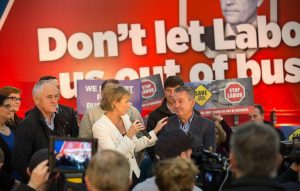
Smeaton Grange was the venue for a truckie rally yesterday attended by the Prime Minister Malcolm Turnbull and a host of senior Coalition ministers.
Employment minister Michaelia Cash, transport minister Darren Chester, Senator for NSW and defence minister Marise Payne, assistant minister Angus Taylor and member for Macarthur Russell Matheson converged at the Sydney Trucks & Machinery site for the rally by owner drivers.
Earlier this year, the Turnbull Government successfully abolished the ill-conceived and highly destructive Road Safety Remuneration Tribunal, which was born from a deal between the Transport Union and Labor to grow Union membership and put owner drivers out of business, said Mr Matheson.
“Mr Shorten’s tribunal stopped owner drivers setting their own rates, pricing them out of the market and handing more control to Labor’s union mates, costing local truckies in Macarthur their jobs.
“This rally was about reminding people that the Turnbull Government stands tall with local owner drivers because we know that they’re the lifeblood of our transportation industry and the backbone of the economy in Macarthur.”
Roy Papallo, director of Sydney Trucks & Machinery in Smeaton Grange said, “The majority of our customers are owner drivers and small transport businesses.
“The prohibitive nature of the RSRT would have massive flow on effects for our business, not to mention a lot of other businesses that rely on owner drivers and the money they spend to purchase, maintain and operate their trucks.”
Mount Annan owner driver, John Gibb, of Gibb Express Ltd said, “The abolishment of the RSRT means more work.
“It gives me a chance to expand my business, get another truck and employ someone else.
“Having work is what we want as we’re the backbone of basically all companies out here.
[social_quote duplicate=”no” align=”default”]“Us little guys do all the jobs the big guys don’t want to do.[/social_quote]
“The RSRT cost me three weeks of work; basically, equivalent to $15,000, because the company I was sub-contracted to didn’t want us to work because it was going to cost them an extra $2,000 a week as a result of the compulsory rate increase,” Mr Gibb said.
